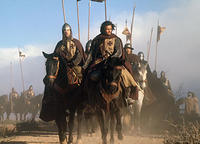Kingdom of Heaven
 I love big, historical epics. If a movie has huge armies, lots of swords, goofy ancient costumes, and a bladder-damaging running time, chances are that I'll love it. Films are the perfect medium through which to capture the grandeur and sweep of history.
I love big, historical epics. If a movie has huge armies, lots of swords, goofy ancient costumes, and a bladder-damaging running time, chances are that I'll love it. Films are the perfect medium through which to capture the grandeur and sweep of history.And so it was with a heavy heart that I trudged out of the theater this weekend after watching Ridley Scott's new epic, Kingdom of Heaven. Yes, it had the amazing battle scenes that define the genre. Yes, the cinematography was astounding, particularly the bluish fog that engulfed the French countryside. This movie had flashes of the brilliance that we have come to expect from a director of Mr. Scott's caliber.
But these flashes were not enough to redeem a film that, despite its two-and-half hour running length, felt rushed and strangely detached. The editors left only a shell of a story, as young Belian (played by the ever-earnest Orlando Bloom) travels thousands of miles over three years, leads an army, and yet returns to France no different than when he first left. Many scenes end rather abruptly, as if the producers were trying to shave off every unused second. Rather than creating the sense of a rapidly moving story, it was merely an annoying distraction. For instance, normally, the life-threatening shipwreck of the film's main character would be an occasion to slow things down a little. Not so here. The entire sequence from boarding to storm to wreck lasts maybe a minute. After regaining consciousness on a strange, foreign beach, Belian gets up, dusts himself off, and staggers through a maze of corpses as if nothing happened. The entire sequence seems more of an afterthought than a plot twist, and the movie is full of such annoyances.
I've read that the DVD version will be almost an hour longer than the theatrical release, which is both encouraging (maybe, in its final form, it won't be so bad after all) and revealing (sitting there in the theater, you can definitely tell there is a lot of movie missing). It seems that the studio, in an effort to appeal to the widest possible audience (i.e., even those with limited attention spans), cut out so much material that the entire film suffers as a result.
Kingdom of Heaven is also controversial for its fawning portrayal of the Muslim leader Saladin. While it's true that Mr. Scott portrays Saladin as a wise, thoughtful, tolerant leader who is forced into war by bloodthirsty Christian zealouts, I think these criticisms miss the point of the film. Kingdom of Heaven is not so much anti-Christian as anti-fundamentalist, both Islamic and Christian. It is a thoroughly agnostic work, suspicious of deeply held religious beliefs of all kinds. This may garner praise from 21st-century secularists, but as a history of the 12th-century, it falls well short. The film says more about contemporary religious attitudes than it does of medieval attitudes, and that is its greatest failing.

0 Comments:
Post a Comment
Subscribe to Post Comments [Atom]
<< Home